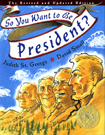So You Want to Be President?
by Judith St. GeorgeSo you want to be president! Why not? Presidents have come in every variety. They've been generals like George Washington and actors like Ronald Reagan, big like William Howard Taft and small like James Madison, handsome like Franklin Pierce and homely like Abraham Lincoln. From the embarrassment of skinny-dipping John Quincy Adams to the mischievous adventure of Theodore Roosevelt's pony, Judith St. George shares the backroom facts, the spitfire comments, and the comical anecdotes that have been part and parcel of America's White House.
TEN TIPS
When using So You Want to Be President in your classroom:
l. Create a So You Want to Be President quiz show about presidents, asking details of their lives that would identify them. Let students use "life lines," such as "phone a friend," and so on.
2. Research a particular president, then keep a journal as if you're that president; imagine a day or week of days in the president's life. Let some of the recollections be historical and some be humorous.
3. Make a comment on a president by sketching a political cartoon, or caricature, a la David Small. (You might want to make a study of political cartoonerie in the United States.)
4. Role-playing: Select a president that you want to represent, then role-play that president in a confrontation with another president over some historical issue.
Example: Dwight Eisenhower and George Washington over war as a way to solve a problem. Use examples from "your" life to prove your point. (Other possibilities: Teddy Roosevelt and Richard Nixon; William Clinton and Abraham Lincoln, etc.)
5. Give students famous sayings such as, "Speak softly and carry a big stick" and "Ask not what your country can do for you, but what you can do for your country," etc., and let them identify the presidents who said them.
6. Create a map, showing where all the presidents lived; can you draw any territorial conclusions?
7. Select a president and write an essay about which values you and this president share.
8. Discuss with another student what characteristics you think a president needs to become a great president. Which characteristics do presidents who failed have in common? Then share with the greater group.
9. You are running for president: In three minutes give a speech telling your "voting" audience what you want to do for your country if you are elected.
l0. Build a White House; include a floor plan, and consider which rooms you need to carry on the duties of president. Designate their functions.
Extra: Plan an election campaign. Decide what your slogan will be, what platform you will run on, and how you will reach your voting audience.







